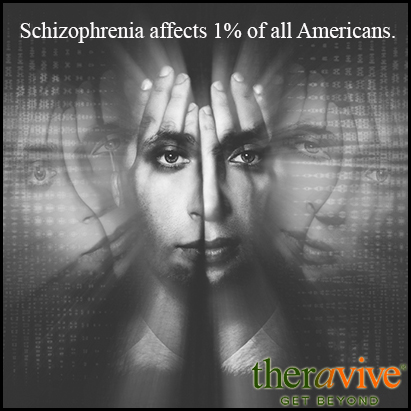 What Is Schizophrenia?
What Is Schizophrenia?
The classic sign of Schizophrenia is hearing voices that other people don’t hear. Schizophrenics may believe that others are reading their mind, controlling their thought, or plotting to harm them. Conversations with schizophrenics may not make a lot of sense. Because schizophrenics may sit for hours without moving or talking they may seem fine until they relate what they are thinking.
Schizophrenia is a life-long debilitating disease that affects about 1% of all Americans. Someone with schizophrenia usually has difficulty holding a job or talking care of themselves, making them reliant on family members (National Institute of Mental Health, 2014).
Causes
Experts think schizophrenia is caused by several factors. Genetics plays a key role, but environment also plays a role. Schizophrenia runs in families. If one identical twin has schizophrenia, the other twin has a 40 to 65% chance of contracting the illness. While the general population has only a 1% chance of developing the disease, 10% of people with a first degree (parent or sibling) with schizophrenia will get schizophrenia. People with a second degree relative (aunt, uncle, grandparent, or cousin) with schizophrenia also have an increased chance of developing the illness when compared to the general populations (O’Donovan, et al., 2003 & 2009).
Scientists are closing in on the specific genes (parts of everyone’s genetic inheritance) that cause or increase a person’s risk of schizophrenia. The brain is an extremely complex organ, and the cause of schizophrenia is also complex. One theory is that rare mutations (changes) in some genes disrupt the development of the brain.
Importantly, it is not yet possible to use genetic information to accurately predict who will develop schizophrenia. Hence, commercial tests available without a prescription or advice from a health care professional cannot predict accurately who will develop schizophrenia. Hope is that someday, with the results of further research, more accurate predictions for the risk of developing schizophrenia will be available.
Environment also likely plays a role in the development of schizophrenia. Genes interact with factors like exposure to viruses, malnutrition (both before birth), problems during birth, and as yet unknown factors.
Treatment of Schizophrenia
Since the cause of schizophrenia is not yet know, it is not possible to cure the disease. Current therapies focus on managing the symptoms of the disorder. Treatments include prescription medications and talking with a therapist. Finding the correct medication and dosage usually involves careful adjustments made in collaborations between doctors and patients.
Medications
There are many medications available to use in managing schizophrenia. They include:
- Chlorpromazine (brandname: Thorazine)
- Haloperidol (Haldol)
- Perphenazine (Etrafon, Trilafon)
- Fluphenazine (Prolixin).
- Risperidone (Risperdal)
- Olanzapine (Zyprexa)
- Quetiapine (Seroquel)
- Ziprasidone (Geodon)
- Aripiprazole (Abilify)
- Paliperidone (Invega)
Clozapine (brand name Clozaril) sometimes has a dangerous side effect called agranulosytosis. This is a loss of white blood cells, which are needed to help a person fight infection. Thus, a person taking Clozaril needs to have a blood test done once every week or two.
Side Effects
Most side effects can be managed successfully. Driving is not recommended when beginning these medications, until adjustments are made to the drugs. Side effects of anti-psychotic medications include:
- Sleepiness
- Dizziness when changing positions
- Blurred vision
- Increased heart rate
- Sun sensitivity
- Rashes on the skin
- Menstrual irregularities
- Stiffness
- Persistent muscle spasms
- Tremors
- Restlessness
As with any medication, a doctor should carefully monitor a person taking them. Other changes in metabolism could potentially lead to diabetes, high cholesterol, or weight gain. Antipsychotic medicines also interact with other drugs, so a doctor must know everything a patient with schizophrenia is taking.
 Psychosocial Treatments
Psychosocial Treatments
Before beginning therapy, a person with schizophrenia needs to be stabilized on antipsychotic medication. The goal of such therapy is to improve daily challenges such as communication, self-care, work and/or school, and relationships. Studies have shown that patients who receive regular counseling are more likely to take their medications and less likely to relapse or be hospitalized. Therapists provide education about schizophrenia and allow patients to better recognize flare-ups of their symptoms (Leucht, et al., 2012).
Recreational Drug Use
Persons with schizophrenia often use recreational drugs, perhaps in an attempt to self-medicate. Unfortunately, illegal drugs like marijuana, amphetamines, and cocaine can exacerbate schizophrenic symptoms. Most substance abuse programs do not take into account psychiatric disorders. Adding confusion to the issue is the fact that symptoms of drug addiction often mimic the characteristics of schizophrenia. There are special programs that seek to treat both schizophrenia and illicit drug use; these produce better results than run-of-the-mill substance abuse programs (McLaren, et al., 2003).
Cigarette Smoking
Schizophrenics are addicted to nicotine at three times the rate of the general population. This drive to smoking leads scientists to search for a biological basis for this need. Additionally, smoking cigarettes may make antipsychotic drugs less effective. Patients who decide to quit or start smoking, need to be carefully monitored by their doctors. Withdrawal from nicotine may cause a worsening of schizophrenic symptoms.
Summary
The exact interaction of genetics and mental health disorders like schizophrenia will take years for scientists and doctors to unravel. Meanwhile, there are many effective medications and treatments for those suffering from this disease.
_________________________________________________________________________________________________________________________________
Leucht S., Tardy M., Komossa K., et al. 2012. Antipsychotic drugs versus placebo for relapse prevention in schizophrenia: a systematic review and meta-analysis. Lancet. 379 (9831): 2063–71.
McLaren J., Silins E., Hutchinson D, Mattick R., Hall W. 2010. Assessing evidence for a causal link between cannabis and psychosis: a review of cohort studies. International Journal of Drug Policy 21 (1): 10–9.
National Institute of Mental Health. 2014. Schizophrenia. Retrieved on May 23, 2014. https://nimh.nih.gov/health/topics/schizophrenia/index.shtml
O'Donovan M., Williams N., Owen M. 2003. Recent advances in the genetics of schizophrenia. Human Molecular Genetics. 12 (2): R125–33.
O'Donovan M., Craddock N., Owen M. July 2009. Genetics of psychosis; insights from views across the genome. Human Genetics. 126 (1): 3–12.